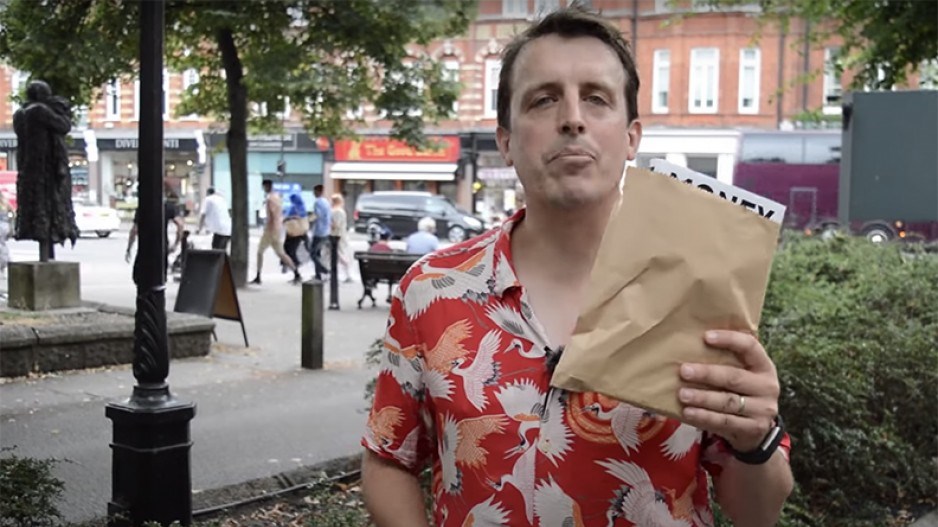A standardized, verified and enforced public registry for beneficial ownership of corporations and “proper penalties” is the gold standard in the fight against money launderers and their enablers, London-based journalist Oliver Bullough told the Cullen Commission of Inquiry into Money Laundering Monday.
Bullough was the third expert to speak in the latest round of witness hearings aimed at establishing a basic understanding of money laundering before Justice Austin Cullen and his counsel begins a deeper dive into the matter in B.C. this fall.
The inquiry was prompted in 2019 largely after media reports of money laundering in casinos and through Metro Vancouver real estate market, though recent commission witnesses, such as Bullough, have put the spotlight on the broader vehicles of corporate crime, such as eminent financial institutions and emerging digital assets.
Bullough, the author of Moneyland, has conducted “kleptocracy tours” in London, England, which has seen its real estate prices spiked by wealthy buyers from Russia, Ukraine and the Middle East – some with ties to corrupt businesses.
Bullough stressed that opaque, multinational corporate structures and layering are the chosen vehicle of money launderers in the international financial system.
He said real estate is often the end point for the laundered money, and his examples drew parallels to Vancouver, such as how properties here have been purchased by corporations, trusts and nominees, such as students.
His tour of a hollowed-out central London now overrun by luxury shops tells of how “money has broken free of any controls” with money laundering and corporate crime.
“We don’t really get anything from it,” he said. “Because all it means is we don’t have shops that normal people might want to go to, like people who don’t want Rolexes. And we don’t have houses that normal people can live in, because no one can afford a 60 million pound house,” says Bullough in a YouTube video.
Ultimately, there’s only so much one can do with dirty money, Bullough told commission counsel Brock Martland in conversation. “Really, if you want to spend a lot of money, real estate is the way to go.
“Once you’ve got a house you can put all your things in it; so the fine art that you’ve got … your astonishingly nice fine wine collection. If you buy a house, you may not live in it; but it’ll be guarded by police.”
He added, “You can wrap a corporate structure around the house and no one knows you own it.”
Bullough said foreign kleptocrats, oligarchs and criminals enjoy places with nice restaurants, good transportation links, the rule of law and good schools for their children.
“Inevitably that means the big Anglophone countries. Not New Zealand now, because they’ve outlawed foreign ownership,” said Bullough.
He explained how limited liability companies (LLCs) are central to money laundering as it allows money launderers to confuse authorities and journalists.
“We’ve allowed the downside to be assumed by the population at large but the upside to be anonymized,” he said.
Martland asked him what role shell companies play. Bullough said shell companies are the same as regular companies in that they are incorporated in government offices and often for a small fee (in B.C. the fee is $1,000 for an LLC). But these companies are created and maintained with a façade of a legitimate operation. They may be sold five or six years later with the appearance they are a simple investment company.
Nominees typically direct companies used for nefarious purposes, he said.
“Normally they will sign a resignation letter without a date on it. So if someone decides to exercise their powers, they’ll have found they have already resigned.”
Bullough said public registries for beneficial ownership need to be established in countries and they must be standardized so information can be shared and tracked across borders.
“You want all the registries to talk to each other,” said Bullough, who noted the British registry goes unverified, giving the example of how “Mr. XXX Stalin” owns a company in Britain.
B.C. is to soon launch a public registry of beneficial land ownership wherein landowners must now provide full disclosure of ownership. The Land Owner Transparency Act states an enforcement officer may demand proof of identity. As for corporate and trust ownership, there must be a declaration provided to government and any shareholder owning 10% or more must be named. Property interest holders must provide a social insurance number or a tax number assigned by the Canada Revenue Agency.
Fines could be significant for anyone caught contravening the new laws: companies face a fine amounting to the greater of $50,000 or 5% of the value of the property. Individuals face a penalty of $25,000 or 5% of the value.
There are some omissions, however. B.C. will not make public the identities of owners who are under 19 years of age, as well as persons “incapable of managing [their] financial affairs,” as determined by a court or health authority.
There’s also an application procedure to omit a public record “if the individual believes that making that information publicly accessible could reasonably be expected to threaten the safety or mental or physical health.”
B.C. has also required, as of May 1, 2020, all private companies to keep and maintain transparency registers. However there is no public registry of beneficial owners yet, although the government recently concluded consultation on the matter.
The private company requirements set an ownership/interest/control threshold of 25% – although most experts contend it should be 10%, which aligns with the land ownership registry and the System for Electronic Disclosure by Insiders (SEDI).
Bullough said journalists and the public generally want an open and verified beneficial ownership registry whereas law enforcement and lawyers have generally been lobbying for closed and verified registry, if one at all.




